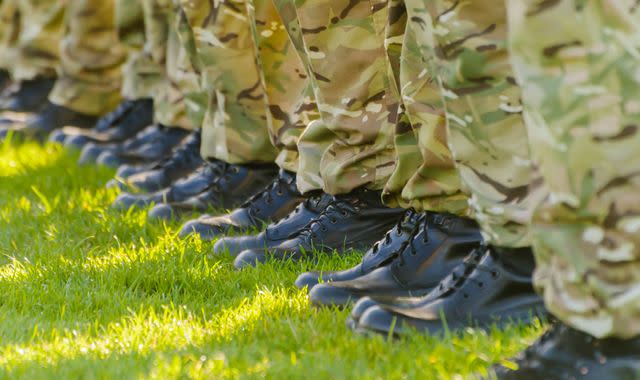UK will probably need a citizen volunteer army to help deter Russia - but conscription is unlikely, military analyst says

The UK will probably need to have a citizen volunteer army in the future as NATO faces the threat of war with Russia - but conscription remains unlikely, a Sky News military analyst has said.
Professor Michael Clarke made the comments after the head of the British Army said UK citizens should be "trained and equipped" to fight in a potential war between NATO and Vladimir Putin's forces.
General Sir Patrick Sanders's remarks have prompted many to question whether he was hinting at a need for conscription if the UK and its NATO allies do end up fighting Russia.
In his speech at the International Armoured Vehicles conference in west London, Sir Patrick said the UK must urgently expand the size of the army to around 120,000 within three years - up from around 74,000 now.
Professor Clarke has told the Sky News Daily podcast that the UK would have to go back to having a "citizen army", adding: "That's not the same as conscription."
He continued: "What Sir Patrick is saying is that, we'll have to go back to bigger forces. It will need to be a citizen army, but a citizen volunteer army of the sort that we've had in the past, and we will probably have to have once again in the future."
Follow latest: Ukraine downed plane in 'terrorist attack', Lavrov says
Britain recruited a huge volunteer citizens' army after the outbreak of the First World War in 1914, with over three-quarters of a million men joining up in eight weeks.
Professor Clarke has said there is a "really important distinction" to be made between conscription and a citizen volunteer army.
He continued: "We're not trying to work ourselves into a war mentality here. What is being said is that we have to be prepared to send an army to Europe that is capable, really capable of fighting the Russians. So that we don't have to.
"If we send an army to Europe that's a paper tiger, the Russians will see through it immediately. It will have no impact.
"If we send an army to Europe that is genuinely capable of fighting with our allies against a Russian attack on NATO, the Russians will see that and there's a fairly good chance we won't have to fight.
"So deterrence is the key to this strategy."
Professor Clarke said that a deterrent has to be credible in order to be effective, and the size of the UK's military at the moment means "we're not credible" in that regard.
He added that the UK army has "almost never" had conscription during its more than 360-year history, adding: "So it's completely antithetical to the British thinking on the military."
It comes as Admiral Lord West, the former head of the Royal Navy, told Sky News the UK would have to "mobilise" in the event of a war between NATO and Russia and hinted citizen volunteers would likely be part of that.
The peer said: "I think the reason Sir Patrick was [talking about training citizens] is because he thinks the army is too small and he thought this is a way of highlighting that.
"But if he really believes that we've got to go down the route of a mobilisation of volunteers... Well that's what we did initially at the beginning of the First World War."
Admiral Lord West also said one of the ways the UK and countries in Europe can help prevent a conflict between NATO and Russia is by spending more on defence.
He added: "Because then when Putin looks, he thinks those people are taking it seriously at the moment."
Read more:
Minister rejects claims army will shrink after danger warning
Critical' for NATO allies to grow defence budgets
Meanwhile, former UK defence secretary Michael Fallon told the Sky News Daily podcast that Sir Patrick's warning about the size of the military and the need for citizens to be trained should be taken "extremely seriously".
He continued: "A number of European countries, interestingly, are now looking at part-conscription.
"Even France has been looking at encouraging some form of military service for younger people when they leave college."
He added that the size of the military is getting "dangerously small" and the military needs to get better at recruitment.
Mr Fallon continued: "Sooner or later, if the military can't improve the way they recruit, then, if it comes to conflict, obviously they will have to look at other methods."
Former US deputy assistant secretary of defence, Jim Townsend, told Sky News's foreign affairs programme The World with Yalda Hakim that the UK military is still "top rank" but there is an issue "in terms of mass".
He said: "There's not enough. There's not enough in terms of ships and planes, pilots, the manning of the Royal Navy
"The US still values the UK tremendously, and it's critical to have the UK alongside us.
"But I think there's a lot of us that wish the UK military was a little bit bigger."


